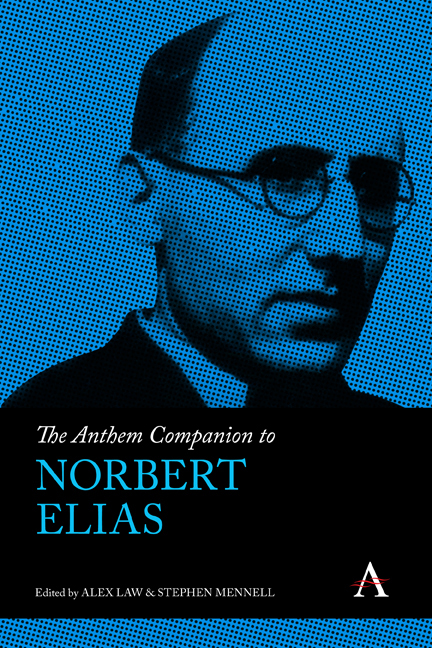Book contents
- Frontmatter
- Contents
- Notes On Contributors
- Acknowledgments
- Introduction: The Sociological Promise of Norbert Elias
- One Norbert Elias: Genesis of a Determined Thinker
- Two Knowledge, Science and Method: The Sociological Practice of Norbert Elias
- Three Norbert Elias’s Comparative Historical Sociology: Against Process Reduction
- Four Power and Process: Norbert Elias and the Paradox of Inequalities
- Five Norbert Elias and Shifting Gender Relations
- Six Travelling With Elias: Figurations and the Racialising Process in South Africa
- Seven Excitement Processes, Embodiment and Power Relations in Sport and Leisure
- Eight Warfare, Survival Units, National Habitus and Nationalism: Norbert Elias’s Contribution to Political Sociology
- Nine Elias’s Contribution to International Relations Theory: Towards a Global Sociology
- Ten Crime, Government and Civilisation: Rethinking Elias in Criminology
- Eleven Art and the Civilising Process
- Twelve From Social Mobility to Channels of Opportunity: Norbert Elias and Education
- Appendix: Published Works of Norbert Elias in English
- Index
Nine - Elias’s Contribution to International Relations Theory: Towards a Global Sociology
Published online by Cambridge University Press: 28 February 2024
- Frontmatter
- Contents
- Notes On Contributors
- Acknowledgments
- Introduction: The Sociological Promise of Norbert Elias
- One Norbert Elias: Genesis of a Determined Thinker
- Two Knowledge, Science and Method: The Sociological Practice of Norbert Elias
- Three Norbert Elias’s Comparative Historical Sociology: Against Process Reduction
- Four Power and Process: Norbert Elias and the Paradox of Inequalities
- Five Norbert Elias and Shifting Gender Relations
- Six Travelling With Elias: Figurations and the Racialising Process in South Africa
- Seven Excitement Processes, Embodiment and Power Relations in Sport and Leisure
- Eight Warfare, Survival Units, National Habitus and Nationalism: Norbert Elias’s Contribution to Political Sociology
- Nine Elias’s Contribution to International Relations Theory: Towards a Global Sociology
- Ten Crime, Government and Civilisation: Rethinking Elias in Criminology
- Eleven Art and the Civilising Process
- Twelve From Social Mobility to Channels of Opportunity: Norbert Elias and Education
- Appendix: Published Works of Norbert Elias in English
- Index
Summary
As in other disciplines, Elias's work made a late impact in the field of International Relations (IRs), particularly in the English-speaking world. This happened mainly in the early 2000s when IR scholars were stuck in a theoretical deadlock after the publication of Wendt's seminal book Social Theory of International Politics in 1999. At the time, Elias’s sociology was an avenue few thinkers explored to overcome the sterile structure – agency debate. Not only did Elias's ontology based on social interdependences represent a promising way forward, but his sociology was also particularly well-suited for the move from international (and more often than not, interstate) relations to global studies. The Eliasian perspective, anchored in long-term processes, helps make sense of a troubled and rapidly changing world. Elias's theory which focuses so much on violence – a major feature of IRs – is useful for IR thinkers insofar as it is grounded in a general theory of the (de-)civilising processes in which emotions are not overlooked. Moreover, Elias's sociology contributes to a re-integration of the human, the social as well as the emotional into the discipline, thus avoiding the state-centrism and static nature of most IR thinking. This chapter proposes firstly, to examine the introduction of figurational sociology into different national IR landscapes, and to highlight Elias's contribution to a renewed research programme that echoes earlier insights of the English School. Secondly, this chapter explores how Elias's conceptual toolbox (namely, figurations, the (de-)civilising process and habitus) can contribute to reframing IR ways of thinking. Lastly, this chapter will probe what a Global Sociology could look like and how it could help us think about the challenges posed to humanity.
The Introduction of Elias to the Discipline of International Relations
Elias's work experienced various trajectories depending on national disciplinary landscapes. For example, the English-speaking academic world took a long time before appreciating Elias's contribution to the social sciences. If he is seen there mainly as a sociologist, several political scientists specialising in IRs, which contributed to his discovery in this field of inquiry.
- Type
- Chapter
- Information
- The Anthem Companion to Norbert Elias , pp. 167 - 184Publisher: Anthem PressPrint publication year: 2023

